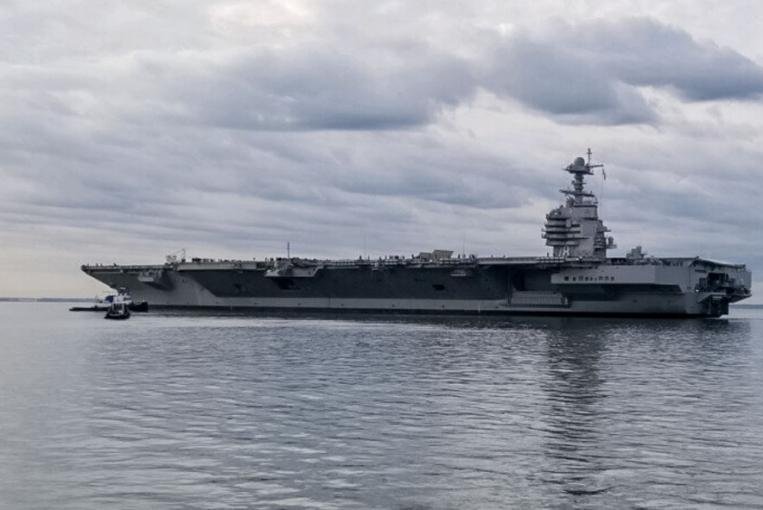The new aircraft carrier USS Gerald R. Ford completed a pierside exercise, the U.S. Navy reported on Thursday, but problems remain and the ship will not be deployed until 2024. Photo courtesy of U.S. Navy
Oct. 25 (UPI) -- The troubled aircraft carrier USS Gerald R. Ford completed a five-day pierside exercise, the U.S. Navy announced, although it may not be ready for service until 2024.
The "fast cruise," a final exercise in the ship's 15-month Post Shakedown Availability series of tests, put Navy personnel into scenarios that tested their ability to respond to challenging situations while still at the Huntington Industries-Newport News Shipbuilding site in Virginia.
The vessel departed the site Friday, the Navy announced, and is preparing to start sea trials.
"The fast cruise was an opportunity for the crew to put into action the lessons they've learned over the past 15 months," Lt. Cmdr. Nick Devorak, the aircraft carrier's training officer, said Thursday in a press release. "While in Newport News, the crew has been regularly conducting General Quarters drills, man overboard evolutions, and the like. The last five days allowed the team a dedicated period to put their knowledge and skills to the test in a simulated at-sea environment. Evolutions like the fast cruise are critical because it gets sailors in the right mindset before taking a warship to sea."
Upcoming tests include the Full Ship Shock Trial, in which explosives are detonated near a new Navy vessel to simulate near-misses in a battlefield environment to test the validity of the ship's construction.
While it is undergoing trials, the $13 billion vessel is three years behind schedule. Commissioned in 2019, its deployment target date of 2017 was moved to 2022 and again to 2024, inhibiting the Navy's ability to deploy carriers of the Atlantic Fleet.
The first of at least four Ford-class of aircraft carriers, the nuclear-powered vessel is regarded as a major improvement over Nimitz-class aircraft carriers currently in use. The Fords are larger, have better anti-missile sensors, a more efficient deck layout and include electromagnetic catapults to launch planes, rather than the maintenance-intensive steam-powered catapults of the Nimitz class carriers.
The Navy has repeatedly delayed the Ford's first operational deployment because of developmental problems discovered in sea trials.
Notably, the catapult system has failed repeatedly, as has aircraft arresting gear used to slow arriving planes. The third of 11 weapons elevators aboard the ship, used to deliver heavy weapons between decks of the ship, are certified to be in functioning condition.
"We're about 75 percent done with the entire project," James Geurts, the Navy's foremost acquisitions official, told the House Armed Service Readiness Subcommittee on Tuesday. "We're talking about in some cases [lining up] 70-ton doors and hatches. It's not a technology issue. It's a construction completion issue in terms of getting all the doors and hatches where they need to be."
Subcommitee member Rep. Elaine Luria, D-Va., who earlier toured the Ford and expressed concern over its availability, demanded data for future Congressional accountability after calling the aircraft carrier a multi-billion dollar "birthing barge."
"I have asked several times from the Navy to have a specific schedule that takes into account the shock trials, the eventual deployment, and all the other pieces that need to go into place" before the vessel can join the Atlantic Fleet," Luria said.
The Navy is not confident that the USS Gerald R. Ford will successfully pass the shock trials without damage, Forbes reported. The branch has indicated that it prefers to move those trials to the next ship in the series, the USS John F. Kennedy, when it is completed.
Two other aircraft carriers in the class are also under construction, but any required fixes observed in the shock trials, to any ship, will push back completion schedules.















